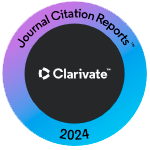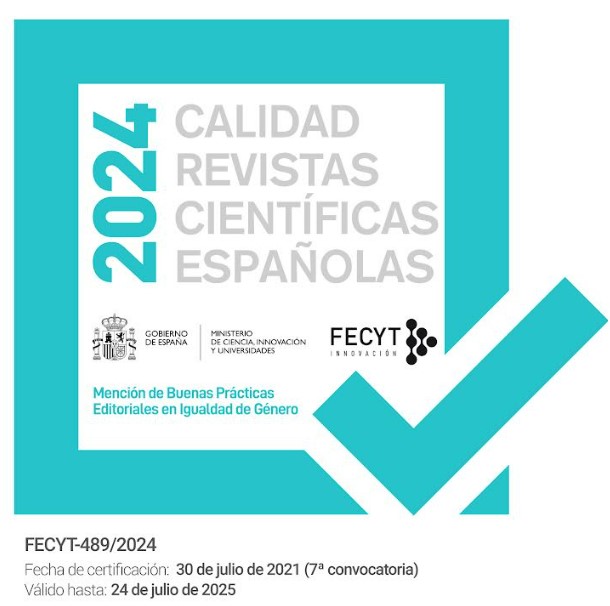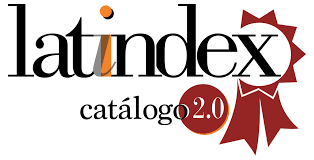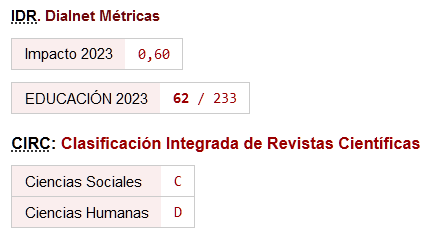Percepciones del profesorado sobre la implementación de metodologías centradas en el alumnado a partir de la formación en Entornos Innovadores de Aprendizaje
DOI:
https://doi.org/10.46661/ijeri.10636Palabras clave:
Percepciones del profesorado, Entornos Innovadores de Aprendizaje, aprendizaje basado en el alumnado, ABP, ludificación, Aula invertida, Pensamiento de diseño, Paisajes de aprendizajeResumen
Este artículo tiene como objetivo conocer la percepción del profesorado con relación al uso de metodologías centradas en el alumnado tras haber realizado una formación en la temática de los Entornos Innovadores de Aprendizaje. Para ello, se creó un cuestionario que se envió al profesorado participante en formaciones de esta temática en la Comunidad Valenciana, al menos tres meses después de la finalización de la misma. Se analizaron 152 respuestas obtenidas, extrayendo el porcentaje de docentes que indican que en efecto aplicaron en mayor medida, después de la formación recibida, metodologías centradas en el alumnado donde el alumnado debe ser responsable de su aprendizaje (55,3%, f=84). Se constata un efecto significativo de las características de la formación recibida en la posterior aplicabilidad, concretamente el efecto de recibir formaciones variadas (p=.003), de más de 20 horas (p=.008) y que incluyen una visita a un espacio de aprendizaje innovador (p=.002). En segundo lugar, se recopiló información sobre las metodologías o estrategias que se empleaban, obteniendo los resultados más altos para las metodologías de Aprendizaje Basado en Proyectos y la Gamificación y los más bajos para el Design Thinking o los Paisajes de Aprendizaje. Estos datos varían ligeramente al analizarlos en función de la etapa educativa donde imparten clase. Se realiza también un estudio de las correlaciones entre metodologías, detectando que Flipped Classroom es la que tiene una correlación débil pero consistente con varias de las metodologías analizadas. Se concluye que es fundamental diseñar programas de desarrollo profesional del profesorado que incluyan formaciones variadas, con una duración de mínimo 20 horas y proporcionando la oportunidad de visitar y experimentar un entorno innovador de aprendizaje.
Descargas
Citas
Alkuş, S., & Olgan, R. (2014). Pre-service and in-service preschool teachers’ views regarding creativity in early childhood education. Early Child Development and Care, 184(12), 1902–1919. https://doi.org/10.1080/03004430.2014.893236
Altay, B. (2014). User-centred design through learner-centred instruction.Teaching in Higher Education, 19(2), 138–155. https://doi.org/10.1080/13562517.2013.827646
Beery, T. A., Shell, D., Gillespie, G., & Werdman, E. (2013). The impact of learning space on teaching behaviors. Nurse Education in Practice, 13(5), 382-387. https://doi.org/10.1016/j.nepr.2012.11.001
Bezanilla, M. J., Fernández-Nogueira, D., Poblete, M., & Galindo-Domínguez, H. (2019). Methodologies for teaching-learning critical thinking in higher education: The teacher’s view. Thinking skills and creativity, 33, 100584. https://doi.org/10.1016/j.tsc.2019.100584
Biggs, J., & Tang, C. (2011). Teaching for Quality Learning at University: What the Student Does. 4th ed. McGraw-Hill.
Blannin, J., Mahat, M., Cleveland, B., Morris, J. & Imms, W. (2020). Teachers as Embedded Practitioner-Researchers in Innovative Learning Environments. Center for Educational Policy Studies Journal, 10(3), 99-116. https://doi.org/10.26529/cepsj.887
Byers, T., Imms, W., & Hartnell-Young, E. (2014). Making the case for space: The effect of learning spaces on teaching and learning. Curriculum and Teaching, 29(1), 5–19. https://doi.org/10.7459/ct/29.1.02
Byers, T., Imms, W., & Hartnell-Young, E. (2018a). Comparative analysis of the impact of traditional versus innovative learning environment on student attitudes and learning outcomes. Studies in Educational Evaluation, 58, 167–177. https://doi.org/10.1016/j.stueduc.2018.07.003
Byers, T., Imms, W., & Hartnell-Young, E. (2018b). Evaluating teacher and student spatial transition from a traditional classroom to an innovative learning environment. Studies in Educational Evaluation, 58, 156–166. https://doi.org/10.1016/j.stueduc.2018.07.004
Cleveland, B. (2016). Addressing the spatial to catalyse socio-pedagogical reform in middle years education. In K. Fisher (Ed.), The translational design of schools (pp. 27–49). Sense Publishers. https://doi.org/10.1007/978-94-6300-364-3_2
Consejo Europeo (2006). Recomendación del parlamento europeo y del consejo de 18 de diciembre de 2006 sobre las competencias clave para el aprendizaje permanente. Diario Oficial de Europa, L394/10, de 30 de diciembre de 2016. https://eur-lex.europa.eu/LexUriServ/LexUriServ.do?uri=OJ:L:2006:394:0010:0018:es:PDF
Cornelius-White, J. (2007). Learner-Centered Teacher-Student Relationships Are Effective: A Meta-Analysis. Review of Educational Research, 77(1), 113–143. https://doi.org/10.3102/003465430298563
Da Silva Santos, L. R., Souza-Pinho, M. J., Santos de Jesus, M., & Kalil, A. (2022). Educational games in the high school: implicate future teachers in the pursuit for new teaching strategies. IJERI: International Journal of Educational Research and Innovation, (17), 27–44. https://doi.org/10.46661/ijeri.4574
European Schoolnet (27 april 2024). Future Classroom Lab. https://fcl.eun.org/
European Schoolnet (29 may 2024). iTEC. http://itec.eun.org/web/guest
European Union. (2013). Improving the quality of in-service teacher training system:analysis of the existing ETTA INSETT system and assessment of the needs for inservice training of teachers (No. EuropeAid/130730/D/SER/HR). European Union.
Freeman, S., Eddy, S.L., McDonough, M., Smith, M.K., Okoroafor, N., Jordt, H., & Wenderoth, M.P. (2014). Active Learning Increases StudentPerformance in Science, Engineering, and Mathematics. Proceedings of the National Academy of Sciences, 111(23), 8410–8415. https://doi.org/10.1073/pnas.1319030111
French, R., Mahat, M., Kvan, T. & Imms, W. (2022). Viewing the transition to innovative learning environments through the lens of the burke-litwin model for organizational performance and change. Journal of Educational Change, 23, 115-130. https://doi.org/10.1007/s10833-021-09431-5
Generalitat Valenciana, (10 march 2024). Aules Transformadores D´espais i Metodologies Educatives. https://portal.edu.gva.es/aulestransformadores/es/inicio/
Gonzalez-Mohino, M., Rodriguez-Domenech, M., Callejas-Albiñana, A., & Castillo-Canalejo, A. (2023). Empowering Critical Thinking: The Role of Digital Tools in Citizen Participation. Journal of New Approaches in Educational Research, 12(2), 258-275. https://doi.org/10.7821/naer.2023.7.1385
Granda-Pinan, A.R., Lozano, O. R. & Alameda Villarrubia, A. (2024). Training on Innovative Learning Environments: Identifying Teachers’ Interests. Educational Sciences, in press.
Granda-Pinan, A.R., Roda-Segarra, J. & Mengual-Andrés, S. (2024). Espacios digitales de aprendizaje como prolongación del espacio físico en el contexto de los Entornos Innovadores de Aprendizaje. En Morales Cevallos, M. B., Marín-Marín, J. A., Berbel Oller, P. y Villegas Castro, A. S. (Coords.), Desafíos de la educación contemporánea: perspectivas formativas para una sociedad digital (pp. 86-103). Dykinson. https://doi.org/10.2307/jj.17381582.9
Granda-Piñán, A.R. & Rojo-Bofill, L.M. (2024). Los Entornos Innovadores de Aprendizaje como respuesta a los retos educativos del siglo XXI. Research in Education and Learning Innovation Archives, 32,22-35. https://doi.org/10.7203/realia.32.27803
Hong, W. P. (2012). An international study of the changing nature and role of school curricula: from transmitting content knowledge to developing students’ key competencies. Asia Pacific Education Review, 13(1), 27–37. http://dx.doi.org/10.1007/s12564-011-9171-z
Hoskins, B., & Deakin, R. (2010). Competences for Learning to Learn and Active Citizenship: different currencies or two sides of the same coin? European Journal of Education, 45(1), 121-137. http://dx.doi.org/10.1111/j.1465- 3435.2009.01419.x
Imms, W., Morris, J., Bradbeer, C., & Mahat, M. (2023). What should be the focus of next generation learning spaces research? An international cross-sector response White Paper from the Innovative Learning Environments and Student Experience Scoping Study. https://ilesescopingstudy.com.au/
INTEF. (4 march 2024). Aula del Futuro. https://auladelfuturo.intef.es/
Jiménez-Hernández, D., Sancho-Requena, P., & Sánchez-Fuentes, S. (2021). Estudio acerca de las opiniones del profesorado universitario en la Región de Murcia sobre la formación de métodos activos. Revista Electrónica Interuniversitaria de Formación del Profesorado, 24(2). https://doi.org/10.6018/reifop.444381
Jorion, N., Taeyaerts, D., & Jeanes, W. (2016). Promoting collaboration using team based classroom design. Creative Education, 07(05), 724–729. https://doi.org/10.4236/ce.2016.75076
Lawshe, C. H. (1975). A quantitative approach to content validity. Personnel Psychology, 28(4), 563–575. https://doi.org/10.1111/j.1744-6570.1975.tb01393.x
Losada-López, J.L. y López-Feal Ramil, R. (2003). Métodos de investigación en ciencias humanas y sociales. Thomson-Paraninfo.
Martín-Gutiérrez, Á., Said-Hung, E. & Conde-Jiménez, J. (2024). Social media and non-university teachers from a gender perspective in Spain. Journal of New Approaches in Educational Research, 13 (10). https://doi.org/10.1007/s44322-024-00010-z
Mcmillan, J.H. & Schumacher, S. (2005). Investigación educativa. Una introducción conceptual. Pearson Educación.
Michael, J. (2006). Where’s the Evidence That Active Learning Works?. Advances in Physiology Education, 30(4), 159–167. https://doi.org/10.1152/advan.00053.2006
Nzarirwehi, J. & Atuhumuze, F. (2019). In-Service Teacher Training and Professional Development of Primary School Teachers in Uganda. IAFOR Journal of Education, 7(1), 19-36. https://doi.org/10.22492/ije.7.1.02
Osamwonyi, E. F. (2016). In-service education of teachers: Overview, problems and the way forward. Journal of Education and Practice, 7(26), 83–87.
Pelletier, K., Robert, J., Muscanell, N., McCormack, M., Reeves, J., Arbino, N., Grajek, S., Birdwell, T., Liu, D., Mandernach, J., Moore, A., Porcaro, A., Rutledge, R., & Zimmern, J. (2023). 2023 EDUCAUSE Horizon Report, Teaching and Learning Edition. https://library.educause.edu/-/media/files/library/2023/4/2023hrteachinglearning.pdf?#page=36
Prince, M. (2004). Does Active Learning Work? A Review of the Research. Journal of Engineering Education, 93(3), 223–231. https://doi.org/10.1037/xap0000470
Rivera-Vargas, P., Calderón-Garrido, D., Jacovkis, J. & Parcerisa, L. (2024). Exploring student and family concerns and confidence in BigTech digital platforms in public schools. Journal of New Approaches in Education Research 13 (5). https://doi.org/10.1007/s44322-023-00003-4
Ruiz-Primo, M.A., Briggs, D., Iverson, H., Talbot, R. & Shepard, L.A. (2011). Impact of Undergraduate Science Course Innovations on Learning. Science, 331(6022), 1269–1270. https://doi.org/10.1126/science.1198976
Sheth, S. (2004). Knowledge for teacher development in India: The importance of local knowledge for in-service education. International Journal of Education Development, 24, 39–52. https://doi.org/10.1016/j.ijedudev.2003.09.003
Stes, A., Min-Leliveld, M., Gijbels, D. & Van Petegem, P. (2010). The Impact ofInstructional Development in Higher Education: The State-of-the-Art of the Research. Educational Research Review, 5(1), 25–49. https://doi.org/10.1016/j.edurev.2009.07.001
Taveras-Pichardo, L. (2022). Cognitive and affective variables predictive of the academic performance of university students. IJERI: International Journal of Educational Research and Innovation, (18), 118–131. https://doi.org/10.46661/ijeri.6189
Tristán-López, A. (2008). Modificación al modelo de lawshe para el dictamen cuantitativo de la validez de contenido de un instrumento objetivo. Avances en medición, 6(1), 37-48.
Wilson, M. E. (2004). Teaching, learning, and millennial students. New Directions for Student Services, (106), 59–71. https://doi.org/10.1002/ss.125
Descargas
Publicado
Cómo citar
Número
Sección
Licencia
Derechos de autor 2024 Amelia R. Granda-Piñan, Alberto Alameda Villarrubia, Santiago Mengual Andrés

Esta obra está bajo una licencia internacional Creative Commons Atribución-NoComercial-SinDerivadas 4.0.












